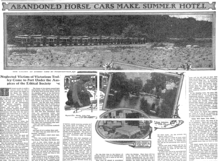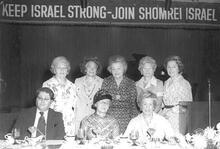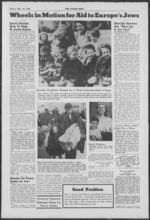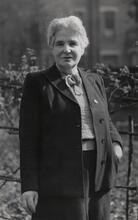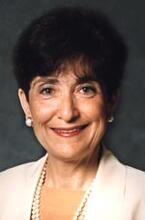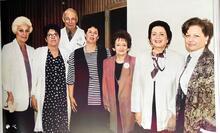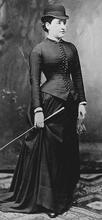Blanche Cohen Nirenstein
Descending from a family active in Jewish communal life, Blanche Cohen Nirenstein further developed her leadership abilities in a wide range of social science activities. Nirenstein began her organizational work as founding president of the Ladies Educational Society of Congregation Sons of Israel in Brooklyn. In 1919 her family built Camp Tranquility, a kosher camp for immigrant children. She went on to found the Manhattan Chapter of Mizrachi Women’s Organization of America (AMIT) in 1942, which raised funds for children in Palestine. She also served as president of Yeshiva College’s Women’s Organization, raising scholarship money. For eighteen years, she served as president of the Rabbonim Aid Society at the Jewish Center, where she raised funds to support rabbis and their widows, particularly Holocaust survivors.
A descendant of a family active in Jewish communal life, Blanche Cohen Nirenstein further developed her legacy of leadership in a wide range of social science activities.
Early Life and Family
Nirenstein was born in Manhattan on November 24, 1885, to David and Wilhemina (Minnie) Cohen. Her parents named her Bluma, which she formally changed to Blanche upon graduation from high school. She was the fourth of eleven children, seven of whom lived to adulthood. Her maternal grandparents, the Levys, were immigrants from Germany and among the founders of the Hebrew Immigrant Aid Society.
Her father, David Cohen, who had emigrated from Suwalk, Lithuania, at age fourteen, was a descendent of the Vilna Head of the Torah academies of Sura and Pumbedita in 6th to 11th c. Babylonia.gaon. Cohen worked in the real estate business and devoted considerable energy to Orthodox Jewish educational institutions and synagogues. He served as president of the Rabbi Isaac Elhanan Theological Seminary, the forerunner of Yeshiva University, in its early years. He was a founder of the Rabbi Jacob Joseph School (RJJ), the Uptown Lit. "study of Torah," but also the name for organizations that established religious schools, and later the specific school systems themselves, including the network of afternoon Hebrew schools in early 20th c. U.S.Talmud Torah, Beth Israel and Lebanon Hospitals, Bronx Machzikei Talmud Torah, and the Hebrew Teachers’ Institute, and was founder and president of the Eldridge Street Synagogue on the Lower East Side.
Blanche Cohen was married in 1906 to Alexander Schlang, a realtor who was a builder of Congregation Sons of Israel in Brooklyn. She founded the Ladies Educational Society of this Orthodox congregation and served as its president. She had a daughter, Hortense (b. 1907), and three sons: Maurice Herbert “Mike” (b. 1909), Joseph (b. 1911), and David (b. 1912). The family moved from Brooklyn to Manhattan in 1929, on the day of the Wall Street crash. Alexander Schlang died on December 31, 1944, and Blanche subsequently married Ellick Nirenstein, a banker.
Life’s Work
In 1919, her family founded a Term used for ritually untainted food according to the laws of Kashrut (Jewish dietary laws).kosher summer camp for immigrant children named Camp Tranquility, on farm land in Earlton, New York. Nirenstein was active in Tranquility’s Women’s League from its inception until the end of her life, supporting its goal of providing quality camp experience for children in need. Yeshiva College Women’s Organization also benefited from her leadership; she served as president and raised scholarship money for students of the college. In 1942, Nirenstein founded the Manhattan chapter of Mizrachi Women’s Organization of America (later known as AMIT), an organization dedicated to caring for and educating disadvantaged Jewish children in Palestine. As president of the Manhattan chapter, she raised funds to sponsor the creation of youth villages and vocational schools. She was president of the Rabbonim Aid Society for eighteen years, raising and distributing much needed funds to support impoverished rabbis and their widows, particularly victims of the Holocaust, and at the time of her death she was chair of the society’s board of directors. The Rabbonim Aid Society was based at The Jewish Center, an Orthodox synagogue on the West Side, where Nirenstein was an active member, as were both her husbands.
Her husband Ellick Nirenstein died on June 21, 1957. Nirenstein’s communal activity continued unabated, as an experienced volunteer leader at the helm of charitable social service organizations to promote traditional Jewish life in America and in Israel. Toward the end of her life, Nirenstein was honored as Mother of the Year by the RJJ School Ladies League, the yeshiva day school where she was a life member and a patron.
Blanche Cohen Nirenstein died at age eighty-seven on September 3, 1972, in New York City.
AJYB 74:558.
Andron, Richard (Ricky) [grandson]. Telephone interview by author. Boca Raton, Fla., winter 1996.
Andron, Sandy [grandson]. Telephone interview by author. Miami, Fla., winter 1996.
Bellovin, Tobi. Telephone interview by author. AMIT National Office, NYC, fall 1996.
EJ, s.v. “Yeshiva University”.
Harstein, Sam, and Sylvia Hershkovits. Telephone interview by author. Yeshiva University, NYC, fall 1996.
Klaperman, Gilbert. The Story of Yeshiva University (1969).
Miller, Pearl [niece]. Telephone interview by author. Miami, Fla., winter 1996.
Obituary. NYTimes, September 4, 1972, 18:6.
Schlang, David. Telephone interview by author. NYC, summer 1996.
Schlang, Mike. Telephone interview by author. Palm Beach, Fla., winter 1996.
Shick, Rabbi. Telephone interview by author. Rabbi Jacob Joseph School, NYC, fall 1996.
Smolowe, Greta [granddaughter]. Telephone interview by author. North Carolina, winter 1996.

